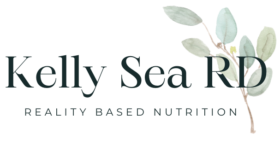Frequently Asked Questions
What is a Registered Dietitian (RD)?
A Registered Dietitian (RD or RDN) is a health care professional educated in nutrition and foods who is able to translate scientific information into practical solutions to help individuals make positive lifestyle changes.
To become a Registered Dietitian, individuals need to hold at least bachelor’s degree in nutrition, followed by completing a 1200 hour supervised practice program through an accredited institution, and pass the national registration exam. Registered Dietitians maintain their credentials via required continuing education.
Why choose a Registered Dietitian for diabetes coaching?
Registered dietitians are experts in nutrition with specialized knowledge in diabetes management. They provide evidence-based guidance tailored to individual needs, ensuring safe and effective strategies for incorporating real foods into your lifestyle.
How can real food help manage diabetes?
Real foods, as opposed to processed ones, provide a balanced blend of nutrients which can aid in controlling blood sugar levels. When eating real foods, the body is more satiated and better able to process nutrients, reducing chronic metabolic dysregulation like insulin resistance. Real foods contribute to sustained energy, support healthy weight management, and reduce the risk of complications associated with diabetes.
Is it possible to reverse diabetes?
Type 2 diabetes can be reversible through lifestyle changes that improve insulin sensitivity and blood sugar control. This is also referred to as diabetes remission. By adopting a balanced diet that prioritizes whole, nutrient-dense foods and manages carbohydrate intake, individuals can achieve balanced glucose response, weight loss and reduce fat accumulation around organs, improving insulin function. In addition to diet changes, regular physical activity enhances glucose utilization and metabolic health. With consistent healthy habits, many people can effectively manage and even reverse type 2 diabetes, although close medical supervision is advised to monitor progress and adjust treatments as necessary.
Is this coaching suitable for type 1, type 2 and pre-diabetes?
Yes, real food diabetes coaching is designed to support individuals with both type 1 and type 2 diabetes, as well as pre-diabetes. The personalized approach takes into account each person’s unique needs, preferences, and goals, adapting strategies accordingly.
What can I expect from the coaching process?
The coaching process involves one-on-one sessions with a registered dietitian who will assess your current habits, preferences, and medical history. You’ll receive personalized nutrition plans, meal ideas, and lifestyle strategies centered around real foods, along with ongoing support to help you succeed on your diabetes management journey.
